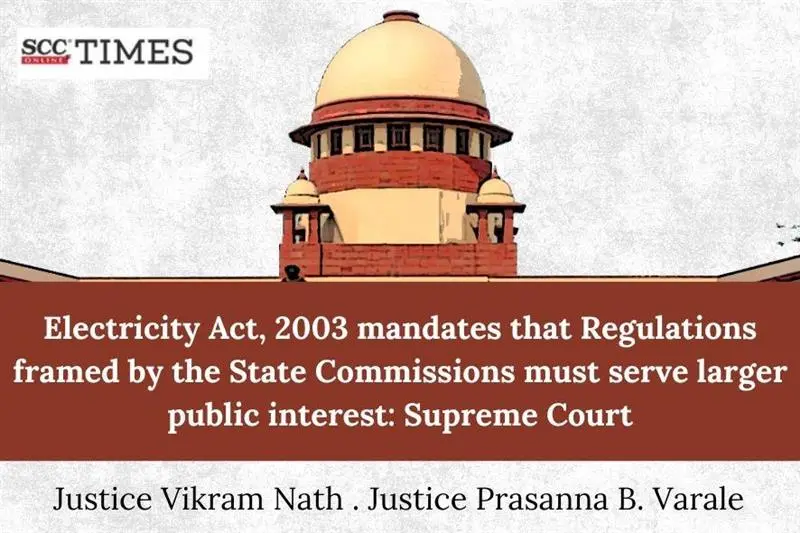Supreme Court: While considering the instant appeals concerning the imposition of restrictions and conditions on the exercise of open access for captive power plants and other large consumers of electricity via Rajasthan Electricity Regulatory Commission (Terms and Conditions for Open Access) Regulations, 2016 framed by the Rajasthan Electricity Regulatory Commission in the exercise of its powers under Section 42 read with Section 181 of the Electricity Act, 2003; the Division Bench of Vikram Nath* and Prasanna B. Varale, JJ., held that statutory scheme under the Electricity Act mandates that regulations framed by State Commissions must serve the larger public interest.
It was held that Rajasthan Electricity Regulatory Commission (RERC) derives its authority from the Act of 2003, which vests in it the power to frame regulations governing open access, scheduling, and penalties. The requirement for scheduling, imposition of penalties, and limits on drawal are not arbitrary but are measures falling within the regulatory ambit of the Commission to ensure grid stability and fair competition. The Electricity Act envisions a structured and fair mechanism for open access while ensuring that market participants do not engage in practices detrimental to the larger consumer base.
Background and Legal Trajectory:
The appellants are engaged in industrial production and have substantial power consumption requirements. Prior to the introduction of the Regulations of 2016, the appellants were availing open access under the Rajasthan Electricity Regulatory Commission (Terms and Conditions for Open Access) Regulations, 2004, which permitted them to draw power from both, their captive generation and open access sources, without any reduction in the contracted demand from the distribution licensee. The open access facility under the Regulations of 2004 allowed the appellants to schedule their power requirements on a day-ahead basis for each 15-minute block, with the flexibility to meet shortfalls through their contracted demand from the distribution licensee.
The 2016 Regulations were notified by the RERC and the key change introduced by the Regulations of 2016 was the imposition of limitations on the simultaneous drawal of power through open access and contracted demand from the distribution licensee. Under the new regime, if a consumer opted to procure power through open access, the contracted demand from the distribution licensee would be reduced by the quantum of power scheduled through open access. Additionally, the Regulations of 2016 imposed penalties for overdrawal and under-drawal from the contracted demand.
The appellants approached Rajasthan High Court (Jodhpur and Jaipur Benches) challenging specific provisions of 2016 Regulations with their primary contention being that the Regulations of 2016 sought to undermine the statutory right of open access guaranteed under Section 42 of the Electricity Act by imposing unreasonable restrictions on the simultaneous use of open access and contracted demand. It was further contended that imposition of penalties for variations in drawal, even when caused by unforeseen breakdowns or operational exigencies, was unjust and discriminatory. Before the Jaipur Bench, the appellants contended that the Regulations of 2016 amounted to an extra-territorial application of the RERC’s regulatory power, which was beyond the statutory mandate conferred under the Electricity Act.
Both the Benches of the High Court upheld the validity of the Regulations of 2016, with the Jodhpur Bench holding that RERC was empowered to regulate open access to ensure grid stability and efficient load distribution.
Issues:
-
Whether the RERC has the jurisdiction to regulate inter-state open access under the Electricity Act?
-
Whether the imposition of penalties for variations in drawal from contracted demand amounts to an unreasonable restriction on the right to open access under Section 42 of the Electricity Act?
-
Whether Regulation 26(7) is ultra vires for requiring an advance notice of 24 hours a day prior, thereby preventing urgent procurement and creating an artificial barrier to open access as protected by the Electricity Act?
-
Whether Regulation 21 is arbitrary and discriminatory, thereby discouraging captive power generation by creating unreasonable distinction between CPPs and state distribution companies?
-
Whether the appellants’ right to open access is foreclosed by the Regulations of 2016?
Court’s Assessment:
Perusing the facts and trajectory of the case, the Court delved into statutory scheme as provided in the Electricity Act, 2003 and the 2016 Regulations. Considering the afore-stated issues, the Court explained that the Electricity Act establishes a clear distinction between the regulatory functions of the CERC and State Commissions. While inter-state transmission falls within the domain of the CERC under Section 79(1)(c), the power of the State Commission to regulate intra-state transmission and distribution under Section 86(1)(c) is well established.
The Court opined that the Regulations of 2016 do not seek to regulate inter-state transmission per se but rather ensures that transactions impacting the Rajasthan grid remain under the oversight of the State Commission. Section 79(1)(c) of the Electricity Act, defines the regulatory authority of the CERC over inter-state transmission of electricity. However, this provision does not strip State Commissions, including RERC, of their jurisdiction over intra-state aspects of open access. Section 42(2) expressly empowers State Commissions to regulate open access within their respective states, ensuring fair and non-discriminatory access to transmission and distribution networks within the state.
The key determinant is not the source of power but its delivery, end-user, and consumption within Rajasthan’s intra-state grid. The Electricity Act provides a framework for demarcating responsibilities between CERC and State Commissions, ensuring that intrastate aspects of electricity regulation remain within the purview of State Commissions. Therefore, RERC retains jurisdiction over intra-state transactions even if the power originates from another state. “RERC’s authority to regulate intra-state aspects of open access transactions, even when electricity is sourced from another state, aligns with the Act’s objectives and ensures effective regulatory oversight”.
The Court explained that Electricity Act guarantees non-discriminatory open access to consumers but does not exempt them from complying with regulatory conditions essential for the effective functioning of the electricity network. Regulation of drawal variations is crucial for balancing power supply and demand, particularly in the context of the grid’s technical constraints and the need to prevent unscheduled fluctuations that may disrupt the system. Furthermore, the penalty mechanism is not an unreasonable restriction but rather a measure to ensure that consumers adhere to their contractual obligations, preventing undue burden on the system and other stakeholders. Uncontrolled variations can lead to deviations that may cause frequency imbalances, affecting overall grid security.
Additionally, the regulations apply uniformly to all open access consumers, ensuring that there is no arbitrary targeting or discrimination. The principle of open access is not absolute and must be exercised in a manner that does not compromise the operational integrity of the power sector. The 2016 Regulations, therefore, serve a critical function in preventing such disruptions by enforcing discipline among generators and consumers alike. The penalties imposed are a deterrent mechanism to prevent strategic gaming of the system and to ensure that all stakeholders adhere to scheduling norms. “The State Commission’s role is to balance the rights of individual market participants with the broader objective of ensuring an efficient, reliable, and stable power supply to all consumers in the State”.
The Court further pointed out that Regulation 26(7), of the 2016 Regulations, which mandates a 24-hour advance notice for availing short-term inter-state open access, serves a critical function in maintaining grid stability and ensuring proper scheduling of power. The requirement of prior notice is a reasonable procedural safeguard that aligns with the objectives of the Electricity Act, particularly those laid out in Section 42, which envisages a structured approach to open access. The 24-hour notice period ensures that both transmission and distribution licensees, as well as load despatch centres, have adequate time to adjust their schedules and prevent system disturbances. Moreover, it prevents misuse by entities that may attempt to take advantage of real-time price fluctuations, thereby engaging in speculative trading rather than genuine demand based procurement. Further, the option of purchasing power from the real-time market and day-ahead market in need of urgent procurement is always available and is not prevented by the impugned Regulations. “The requirement is uniformly applicable to all consumers, ensuring that no undue advantage is given to any particular category. Considering the technical and regulatory imperatives involved, the 24-hour advance notice condition under Regulation 26(7) cannot be considered ultra vires, as it falls within the regulatory domain of the State Commission to establish fair, transparent, and nondisruptive mechanisms for open access”.
The Court then explained that Regulation 21 of the 2016 Regulations which governs aspects of scheduling, penalties, and compliance for captive power generators, does not impose undue restrictions on captive generators but ensures that their operations align with grid discipline, preventing any adverse impact on the larger power ecosystem. The regulatory framework ensures that captive generators contribute fairly to system stability without imposing additional burdens on distribution licensees and other grid participants. Thus, Regulation 21 is neither arbitrary nor discriminatory but rather a necessary and proportionate measure to balance the interests of various stakeholders in the electricity sector.
The Court stated that the Regulations of 2016, while imposing certain conditions, do not outright deny open access but ensure that its implementation is equitable and does not jeopardize grid discipline. Open access remains available to consumers who comply with regulatory prerequisites, including scheduling obligations and financial commitments. The Regulations of 2016 are consistent with the legislative intent of the Electricity Act, ensuring that open access is exercised in a manner that does not compromise system stability, fairness, or economic viability. Therefore, the regulatory framework does not foreclose open access but rather operationalizes it within reasonable constraints essential for sustaining the electricity sector.
Therefore, with the afore-stated analysis, the Court upheld the decisions of the Rajasthan High Court and dismissed the instant appeals.
CASE DETAILS
|
Citation: Appellants : Respondents : |
Advocates who appeared in this case For Appellant(s): For Respondent(s): |
CORAM :








